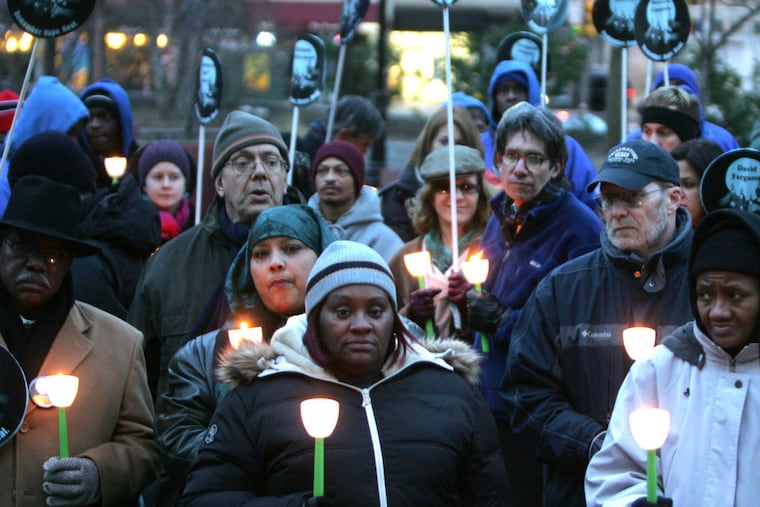Commentary: In Philly, memorial pays tribute to the homeless
By Mary Scullion Elaine, a 37-year-old veteran and talented artist, was homeless in a wheelchair, having lost her legs to frostbite. She suffered from severe PTSD and addiction. Veterans' organizations and other community groups were working with her to help her to break out of homelessness, but early one August morning she was struck by a drunken driver and killed.

Elaine, a 37-year-old veteran and talented artist, was homeless in a wheelchair, having lost her legs to frostbite. She suffered from severe PTSD and addiction. Veterans' organizations and other community groups were working with her to help her to break out of homelessness, but early one August morning she was struck by a drunken driver and killed.
Jim was an accomplished lawyer before mental illness precipitated a fall into homelessness. But even during years when he lived in a shelter, he was a tireless advocate, offering his political analysis and mobilizing energies in the fight for affordable housing, health care, and other critical services. He was working on voter mobilization among the homeless community last summer when he died suddenly.
Gerry, a former city sheriff, spent years on the streets before finally coming into permanent housing. He was kind, caring, and a supportive friend to many fellow residents where he lived. He became a certified peer special for other mental-health consumers. His passing last summer sparked much grieving among the community that had come to love him.
These three names will be read and their lives honored at Wednesday's Homeless Memorial Day. As we have done annually for more than 20 years, hundreds of people will gather at 5 p.m. Wednesday at the Thomas Paine Plaza outside the Municipal Services Building to remember homeless and formerly homeless Philadelphians who passed away this year.
City officials and religious leaders will join with people who have known homelessness personally and those who have not. But everyone there will be united in the conviction that every person has dignity and should be honored in life and in death. They will assert once again that, in this wealthy and powerful nation, no citizen should have to experience the degradation of homelessness, and that we must continue the work to end this national scandal.
We will gather knowing that there is reason to hope. Philadelphia has made much progress in lowering the number of persons experiencing homelessness. The recent U.S. Mayors Report on Hunger and Homelessness points to a trend of homelessness decreasing in communities throughout the country (though hunger is increasing, according to the report).
But this year's gathering will also be marked by an awareness of new challenges. There will be almost 200 names read, the largest number ever - ranging from persons who died on the streets or while in shelter, to persons who had overcome homelessness.
Advocates and city officials are trying to better understand this increase. Certainly, one factor is the horrendous increase in drug overdoses, including the epidemic of opioids. This crisis is affecting people in all sectors of society but, like the advent of crack in the 1980s, is having an especially devastating impact in poor communities. We also know that, despite the economic recovery, Americans at the bottom rung of the economic ladder continue to struggle. Philadelphia's poverty rate is still over 25 percent - an utterly unacceptable number. (More than 200,000 Philadelphians live in "deep poverty" - with incomes of less than $12,000 per year.)
There are no quick fixes to ending homelessness. It requires a long-term vision and a sustained effort to preserve and expand affordable housing while investing in quality education for all our children. With a new administration soon to take over in Washington, we may face the prospect of serious cuts to the social safety net - including the kinds of federal housing subsidies and health-care supports that have helped to dramatically lower the number of persons on the streets in Philadelphia. And at a time when we are seeing disturbing increases in public attitudes of racial and other forms of discrimination in many parts of our society, it is all the more urgent that we open our eyes to our sisters and brothers on the margins. We need to insist that we are a stronger nation when we foster an ethos of compassion and mutual care, especially for the most vulnerable among us.
Homeless Memorial Day begins with the acknowledgment of specific persons, individual names, and unique stories. When we touch those human dimensions of homelessness, we are moved and empowered to act. People like Elaine, Jim, and Gerry call forth the best from us, both in the tragedy and suffering of their lives, but also in the love they gave and inspired, They invite us to both embrace the deepest truths of our own humanity - with its frailties and gifts - and inspire us to work even harder for a more just and compassionate society, one in which each person is given the chance to flourish.
Mary Scullion, a Sister of Mercy, is cofounder and executive director of Project HOME. maryscullion@projecthome.org